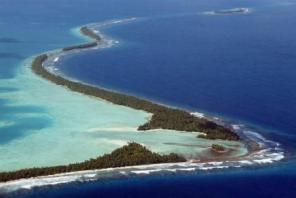 The smallest Pacific island nations, some of which fear being swamped by rising sea levels due to climate change, said Tuesday they had seen little of the global funding promised to combat the problem.
The smallest Pacific island nations, some of which fear being swamped by rising sea levels due to climate change, said Tuesday they had seen little of the global funding promised to combat the problem.
Meeting in Port Vila ahead of a broader two-day Pacific Islands Forum which begins Wednesday, the leaders of some of the world’s tiniest states admitted their voice on the issue was often lost.
“We are the most vulnerable in many respects and therefore we’ve got to take the lead,” the premier of the island nation of Niue, Toke Talagi, told a press conference.
Talagi said that despite the UN-backed global conference in Copenhagen in December — where rich nations promised almost 30 billion dollars in aid from 2010-12 to help poorer countries combat climate change — access to climate-linked funding was difficult to obtain.
“The thing that we are finding is that even with the financial resources that have been promised and pledged, we still haven’t received much at all,” he said.
“We believe at the present moment that the processes are taking too long.”
Palau President Johnson Toribiong said the issue needed to be addressed urgently in the Pacific, where some countries fear they may sink under rising sea levels.
“To the smaller states, climate change is a matter of urgency. It is a matter of life and death to some,” he said.
Talagi said officials from the Cook Islands, Kiribati, the Marshall Islands, Nauru, Palau and Tuvalu had decided to meet in Kiribati later this year to determine a unified position ahead of the next UN climate change meeting in Cancun, Mexico.
“We do have differences, we accept that. But that should not impede us from determining a way forward,” he said.
Kiribati President Anote Tong, who governs a nation of 33 coral atolls southwest of Hawaii which lie on average about two metres (about six feet) above sea level, said the Pacific lacked the resources to address climate change alone.
“There’s no question about it, our voice is not as loud,” he told AFP.
Climate change will be a key issue when the broader 16-nation Pacific Islands Forum, which includes Australia and New Zealand, meets on Wednesday.
But the question of Fiji is set to overshadow the forum, after the country’s military leader Voreqe Bainimarama failed to hold elections as promised.
New Zealand Prime Minister John Key said he expected leaders to stick to their position on Fiji, which is suspended from the forum, and not allow it to return until democracy was restored.
“My view is that the leaders remain united in the view that we want to see democracy restored in Fiji, and while they engage in dialogue with Fiji — as indeed New Zealand does — that doesn’t represent a change in our overall position,” he said ahead of his arrival in Port Vila.
Key said security also remained an issue for the region, once dubbed the “arc of instability” amid concerns about states such as East Timor, the Solomon Islands and Papua New Guinea.
Vanuatu Prime Minister Edward Natapei refused to pre-empt the forum’s decision on Fiji, saying only that it was an important issue for the region.
“Personally, that’s an issue I cannot talk about at this stage,” he told reporters.
Natapei said he was not concerned that several leaders, including Australian Prime Minister Julia Gillard and Papua New Guinea’s Michael Somare, were unable to attend the forum because of domestic political issues.
“I don’t see that as devaluing the value of the meeting,” he said.




